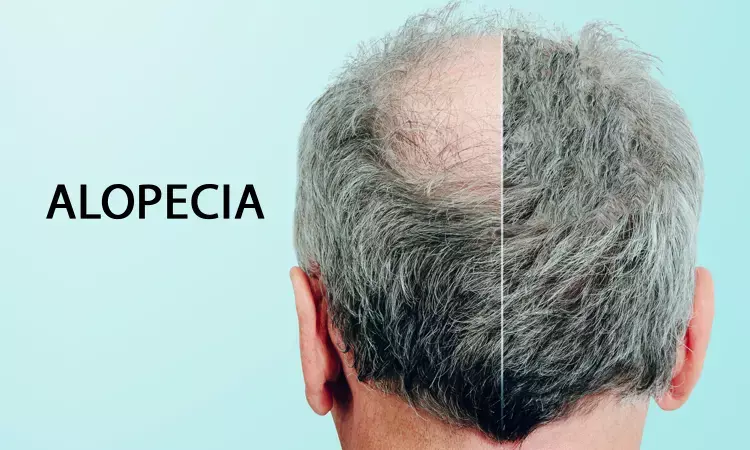- Home
- Medical news & Guidelines
- Anesthesiology
- Cardiology and CTVS
- Critical Care
- Dentistry
- Dermatology
- Diabetes and Endocrinology
- ENT
- Gastroenterology
- Medicine
- Nephrology
- Neurology
- Obstretics-Gynaecology
- Oncology
- Ophthalmology
- Orthopaedics
- Pediatrics-Neonatology
- Psychiatry
- Pulmonology
- Radiology
- Surgery
- Urology
- Laboratory Medicine
- Diet
- Nursing
- Paramedical
- Physiotherapy
- Health news
- Fact Check
- Bone Health Fact Check
- Brain Health Fact Check
- Cancer Related Fact Check
- Child Care Fact Check
- Dental and oral health fact check
- Diabetes and metabolic health fact check
- Diet and Nutrition Fact Check
- Eye and ENT Care Fact Check
- Fitness fact check
- Gut health fact check
- Heart health fact check
- Kidney health fact check
- Medical education fact check
- Men's health fact check
- Respiratory fact check
- Skin and hair care fact check
- Vaccine and Immunization fact check
- Women's health fact check
- AYUSH
- State News
- Andaman and Nicobar Islands
- Andhra Pradesh
- Arunachal Pradesh
- Assam
- Bihar
- Chandigarh
- Chattisgarh
- Dadra and Nagar Haveli
- Daman and Diu
- Delhi
- Goa
- Gujarat
- Haryana
- Himachal Pradesh
- Jammu & Kashmir
- Jharkhand
- Karnataka
- Kerala
- Ladakh
- Lakshadweep
- Madhya Pradesh
- Maharashtra
- Manipur
- Meghalaya
- Mizoram
- Nagaland
- Odisha
- Puducherry
- Punjab
- Rajasthan
- Sikkim
- Tamil Nadu
- Telangana
- Tripura
- Uttar Pradesh
- Uttrakhand
- West Bengal
- Medical Education
- Industry
Oral methotrexate safe and effective treatment option for severe alopecia areata: Study

Canada: Oral methotrexate (MTX) may be a feasible treatment option for patients with severe alopecia areata (AA) who fail other standard therapies, finds a recent study in the Journal of Cutaneous Medicine and Surgery.
None of the suggested therapeutic options for alopecia areata have been consistently effective thus, making the management of severe or refractory cases challenging. Several studies have shown the use of methotrexate (MTX) in alopecia areata (AA); however, the pure effect of methotrexate (MTX) monotherapy remains elusive. Considering the same, Misaki Kinoshita-Ise, Department of Medicine, Sunnybrook Health Sciences Centre, Toronto, Canada, and colleagues aimed to evaluate efficacy and safety of oral methotrexate monotherapy for AA.
For the purpose, the researchers retrospectively reviewed the clinical course of AA patients including pediatric cases treated with methotrexate (MTX) monotherapy. Their detailed clinical data including final treatment outcomes, original severity of AA, side effects, and the duration until maximum response were assessed.
Statistical analysis was performed to evaluate if the clinical factors including the duration of current alopecia, age, the presence of body hair loss, and sex were associated with treatment response.
All included patients had severe AA and failed standard therapies.
Key findings of the study include:
- Thirteen out of 15 cases demonstrated improvement during the monotherapy, and all responders demonstrated the maximum response within 1 year.
- Female patients had significantly better outcomes than male patients.
- Other factors did not significantly influence on the treatment outcome.
- None of the patients experienced side effects that were severe enough to terminate the treatment.
"Our results support methotrexate (MTX) monotherapy as a feasible option for severe AA patients who fail other standard therapies or for whom systemic corticosteroids are contraindicated," concluded the authors.
Reference:
The study titled, "Oral Methotrexate Monotherapy for Severe Alopecia Areata: A Single Center Retrospective Case Series," is published in the Journal of Cutaneous Medicine and Surgery.
DOI: https://journals.sagepub.com/doi/10.1177/1203475421995712
Dr Kamal Kant Kohli-MBBS, DTCD- a chest specialist with more than 30 years of practice and a flair for writing clinical articles, Dr Kamal Kant Kohli joined Medical Dialogues as a Chief Editor of Medical News. Besides writing articles, as an editor, he proofreads and verifies all the medical content published on Medical Dialogues including those coming from journals, studies,medical conferences,guidelines etc. Email: drkohli@medicaldialogues.in. Contact no. 011-43720751


